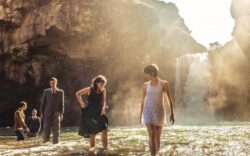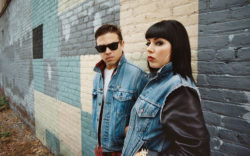I could feel my skin baking in the Texas sun as I futilely waited in line to see The Magnetic Fields Thursday afternoon at The Parish (a 40 Watt-sized club purported to have “the best sound in Austin”). Though I didn’t get in, and would go on to be disappointed many times Thursday by too-long lines and rescheduled-at-the-last-minute shows, I was not once disappointed by the friendliness and general good cheer of the strangers I met during the day, both fellow travelers and native Austinites alike. We shared home towns, talked about the heat, compared notes on the previous day’s shows, talked about the heat, planned our next moves, and talked about the heat, and then talked about the heat some more. Few things unite people like seeing great live music in miserable fucking heat.
I abandoned all hope of entering The Parish and peeled off to find a bar called Rusty’s, where classic rock revivalists Howlin’ Rain were slated to go on shortly. As it turned out, they’d been pushed back by an hour, which left me to either seek out yet another line, or stay and watch a complete unknown, the down-tempo indie rock trio Greylag. A drummerless trio of upright bass, electric, and acoustic guitar, the band’s sensibilities seemed to come straight out of 2002. Like a slightly edgier, and more Southern-rock flavored version of Keane or Snow Patrol, there was absolutely nothing wrong with these guys – I’m sure many people would find them pleasant to listen to – but were I not being paid to write home about them, they would be nothing to write home about.
Thankfully, this mediocre fare was followed by a rip-roaring set from blues-rockers The Stone Foxes. Reminiscent of The Black Keys (before they got huge), this four-piece used chunky guitar solos, psychedelic organ runs, and a backyard washtub full of swagger to get a heat-dazed crowd fired up early in the afternoon. Impressively, lead vocals were taken largely by the rusty-voiced bassist, though the guitarist and organ player both took turns at the mic, and all three wailed like they had sandpaper in their lungs. Even the drummer doubled up for the occasional squealing harmonica solo. This was stompin’ music if I’ve ever heard it, and it quickly brightened what had been, thus far, a frustrating day.
The Stone Foxes were followed (finally) by Howlin’ Rain, the band I’d initially come to see, and again I was met with disappointment. Though their new album *The Russian Wilds* features epic, arena-level production, soaring drums, electric guitars, and production work, Howlin’ Rain failed to deliver on any of that record’s scope and sweep, instead playing as an acoustic guitar trio with no drummer (call it Howlin’ Drizzle). The band’s vocal talent is undeniable, and in the record’s best moments, they sound something akin to Chris Cornell harmonizing with Steven Tyler. As an acoustic trio, that talent was still apparent, but felt so constrained by comparison that, feeling a little cheated, I ventured back out into the Austin wilds before they even finished their set.
After a failed, last-minute gambit to get into a Zola Jesus show, I booked it back across town to the Central Presbyterian Church where Fiona Apple, in 45 minutes, made me forget everything I’d been so annoyed by earlier in the day. Though she’s always had that unnervingly thin uber-waif thing going on, it was enthralling watching her belt it to the extremely high rafters of that cavernous hall, her voice so powerful it seemed at times like it might shatter the frail body that struggled to harness it. When she launched into “Extraordinary Machine,” one of my all-time favorite songs regardless of era or genre, I stood at the exact opposite end of the enormous room from her, silhouetted against a stained glass window at the back of the balcony, and sang along with every word. It was one of those rare concert moments that will stay with me for the rest of my life.
Other than a few candles atop her grand piano, and some eerie red back-lighting, the building was pitch dark, lending her entire performance a sly, devilishly tongue-in-cheek quality, at no time moreso than when she slinked her way through “Criminal” right beneath the biggest cross in the county to close out the show. When she cried “I need to be redeemed to the one I signed against” it was like she was all but daring the good Lord to either forgive her her trespasses, or strike her down right there. Frazzled and out of breath by the end of her set, it’s hard not to wonder about Apple’s health, but it’s also impossible to deny her power. She blew the fucking walls down.
Yet again, the next show I’d planned on attending (psych-folkers Quilt, at Red 7) had been pushed back an hour, so I wandered next door to The Beauty Bar to make sure I got in for Com Truise. Much to my surprise (and delight), The Beauty Bar was in fact a converted Beauty Shop (between this and Empire Automotive, a converted body shop, it seems they’ll turn pretty much anything into a music venue in Austin) complete with retro-mod wall designs and old salon chairs with the perm-domes still attached (not to mention the biggest disco ball I’ve ever seen). Before Com Truise took the stage on the backyard patio, a female hip-hop trio called Hottub got the crowd bouncing inside with their crunk, east-coast flow and beyond-raunchy lyrics and stage banter (let’s just say the closing number was about having large breasts, and enjoying the perks that come with them – no pun intended). Essentially fusing the skill and style of Northern State with the attitude and middle-fingerness of Peaches, these ladies were a whole Hell of a lot of fun.
I bopped my way outside as Com Truise (AKA Seth Haley) set up his tiny city of circuitry. I won’t pretend to know what all of his gear was, but he was twisting knobs, pushing faders, triggering samples, and doing a fair amount of improvising as he wove his spacy, squelchy web of blissful electronica around a fascinated crowd. A live drummer supplied furious workouts in the background, and his beats and Haley’s production circled each other like a pair of steely-eyed boxers, landing haymaker after haymaker but never quite knocking one another out. The sweltering heat inside the overcrowded tent made all but the most basic, head-bobbing-alone type of dancing nearly impossible, but it in no way dampened the crowd’s enthusiasm for this bright, rising IDM talent.
After I exited the Beauty Bar tent and wrung out my shirt, I ambled over to the aforementioned Empire Automotive to check out The Black Angels. A little early, I experienced another happy accident as the club’s smaller backyard stage (which was backed by a giant, spectacularly ornate Zodiac wheel with a smiling half moon painted in its center) was playing host to Metalachi, the self-proclaimed “world’s first and only metal mariachi band.” I kicked myself for not bringing my camera as three men dressed in mariachi-wear complete with light-up sombreros, one man dressed as Axl Rose, and one man who looked like some kind of mariachi/Samurai/GWAR hybrid in his spiked sombrero and skull armor, played covers of classic metal songs in a more-or-less traditional mariachi style. These wackos blew through tunes by Guns N’ Roses, Faith No More, and Bon Jovi with the phenomenal trumpet player replicating most of the guitar solos (though there was some fierce violin-playing in the mix as well). This was definitely a love it or hate it affair, but I thought it was freaking awesome, effectively balancing inherent cheese with legitimate talent and sheer, unbridled enthusiasm. Who knows what the world will have to offer a metal mariachi cover band, but these guys were a trip and I feel lucky to have stumbled upon them.
The Black Angels were fine. I guess. Austin locals, they packed out a sizeable venue, and rocked it hard. There is no doubt. They’re tight and raw, they’ve got good hooks and strong vocals, and their light show was sick (a continuously looping series of expanding and contracting images – purple ovals, blue spheres, orange sunbursts, balls of electricity – was projected both on an array of video screens behind them, and on the larger, exterior wall of the indoor/outdoor club. All that said, I just don’t know. They’re too polished to really feel like the psychedelic act they clearly want to be, and they’re too weird (and talented) to really fit in comfortably with mainstream modern rock. There is something specifically and indefinably Texas about them, which works, until it doesn’t. They’re like the Explosions in the Sky of garage rock – a Texas band that took an ostensibly strange, niche genre, stripped it down to its bare essentials, and cranked it to 11. I’m glad I saw them, but I wouldn’t see them again.
Of course, The Black Angels looked like gods compared to Light Asylum, the obnoxious dance-punk band I had to sit through after heading back across the street for Oneohtrix Point Never. Though it was a nifty trick, rigging an electronic drum pad with all sorts of sounds and samples that she could trigger with her sticks, the duo’s lead singer had a strident, confrontational style that was exhausting and wholly unearned. She repeatedly launched liquids at the crowd from cups and bottles while she barked and screeched over her partner’s repetitive, rudimentary beats and synth lines. As someone who finds even the best dance-punk merely tolerable, sitting through this act felt like a kind of toll for the mesmerizing experience that would follow.
Thankfully, Oneohtrix Point Never (AKA Daniel Lopatin) proved worth the wait within seconds. Though there were definitely lulls and quiet moments in his 50 minute set where the occasional, confused listener would clap awkwardly, I don’t believe he ever actually stopped playing. Familiar phrases from his records served more as touchstones than individual songs as one idea bled into the next with stunning unpredictability and grace. Both the house and stage lights were turned off, leaving performer and audience to commune in considerable darkness, and encouraging eyes-closed listening. As Lopatin appeared to get lost in his own hyper-complex, ever-evolving microproduction, his left hand not even aware of what his right was doing, his music and manner beckoned the audience not just to watch him, but to join him. Though much of the crowd seemed to find this long-form sound collage impenetrable and gave up by the halfway point, those who stayed were bonded together by a shared sonic experience among the shadows.
David Fitzgerald
Like what you just read? Support Flagpole by making a donation today. Every dollar you give helps fund our ongoing mission to provide Athens with quality, independent journalism.










